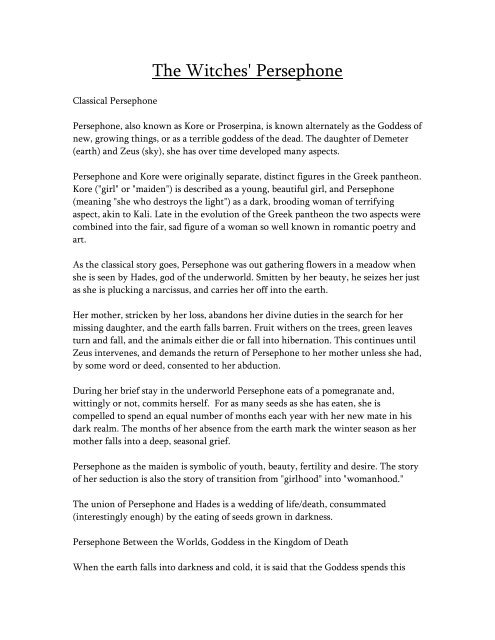- Page 1 and 2:
Goddesses and Gods
- Page 3 and 4:
Balance of the God and Goddess I se
- Page 5 and 6:
Beliefs of Goddess Worship Christia
- Page 7 and 8:
myths associated with the Mother Go
- Page 9 and 10:
The The Crone Crone The Crone is th
- Page 11 and 12:
Celtic Pantheon Goddesses Goddesses
- Page 13 and 14:
Gods of the midsummer harvest. Asso
- Page 15 and 16:
Morrigan and among their children a
- Page 17 and 18:
Pwyll Pwyll He is King of the Other
- Page 19 and 20:
Descent of the Goddess 1993 In anci
- Page 21 and 22:
And thus we are taught of the begin
- Page 23 and 24:
Aten Aten (Amon (Amon-Re (Amon Re R
- Page 25 and 26:
Nephthys Nephthys Nephthys Goddess
- Page 27 and 28:
Thoth Thoth This ibis-headed god is
- Page 29 and 30:
Gapen Gapen A messenger of Baal. Hi
- Page 31 and 32:
Moon God. Tallay Tallay Girl of Rai
- Page 33 and 34:
Nusku) Gira Gira A fire god invoked
- Page 35 and 36:
Lotan, Zu, and Leviathan. Note : As
- Page 37 and 38:
Haia Haia Nidaba's or Nanshe's husb
- Page 39 and 40:
Nazi Nazi Nedu Nedu Married Nindar
- Page 41 and 42:
son of Enlil and Ki. Also, as Ningi
- Page 43 and 44:
coming flood, he refused to repent.
- Page 45 and 46:
This puts him in the perfect positi
- Page 47 and 48:
Samael Samael The Poison of Divinit
- Page 49 and 50:
Alalus Alalus Father of Anus. Anus
- Page 51 and 52:
He was brought back by a Bee, after
- Page 53 and 54:
at and say 'that's not really me' a
- Page 55 and 56:
There's no doubt you'll be successf
- Page 57 and 58:
he's got to stop treating you like
- Page 59 and 60:
gesture from - and why? It's almost
- Page 61 and 62:
After all, it seems to be working a
- Page 63 and 64:
fine whether you stay together or m
- Page 65 and 66:
sense of humor. There's no guarante
- Page 67 and 68:
Discovering the Maiden Goddess A gr
- Page 69 and 70:
to keep our Bright Maiden qualities
- Page 71 and 72:
or national deities. It is an examp
- Page 73 and 74:
pets) and also important in the ico
- Page 75 and 76:
See also Isis. Harpocrates (Hor-pa-
- Page 77 and 78:
She was the sister and wife of Osir
- Page 79 and 80:
Mut (Golden Dawn, Auramooth) The wi
- Page 81 and 82:
ule the skies, but he was murdered
- Page 83 and 84:
own right or, in later times, as on
- Page 85 and 86:
establishing his rule over all Egyp
- Page 87 and 88:
Egyptian Pantheon Goddesses Goddess
- Page 89 and 90:
disc; he appears as a large human w
- Page 91 and 92:
Athena Athena: Athena The Goddess o
- Page 93 and 94:
Theia Theia: Theia Goddess of light
- Page 95 and 96:
oken tusk, a thorn, and a bowl. He
- Page 97 and 98:
Nephthys Nephthys: Nephthys Nephthy
- Page 99 and 100:
her brew -- the same amount of time
- Page 101 and 102:
Mati Mati Syra Syra Zemlya Zemlya:
- Page 103 and 104:
Gods and Goddesses Associated with
- Page 105 and 106:
world's first sacred artifacts. Cha
- Page 107 and 108:
Artemis. Once again Hera showed her
- Page 109 and 110:
Gadel (M, Irish) Hashye-Altye (M, N
- Page 111 and 112:
Bona Dea (F, Roman) Brimo (F, Greek
- Page 113 and 114:
Kichijo-Ten (F-japanese) Lakshmi (F
- Page 115 and 116:
Achilles (M, Greek) Mars (M, Roman)
- Page 117 and 118:
Sin (F, Teutonic) Tyr (MI Teutonic,
- Page 119 and 120:
Greek Gods and Goddesses Achelous G
- Page 121 and 122:
Apollo's mother Leto was forced to
- Page 123 and 124:
Athena is the patron of craftsmen a
- Page 125 and 126:
Daemons A race of invisible beings.
- Page 127 and 128:
Greek god of death, keeper of the u
- Page 129 and 130:
Plutus Greek god of wealth. He was
- Page 131 and 132:
Greek Gods Chart
- Page 133 and 134:
Goddess of Witchcraft, ghosts and t
- Page 135 and 136:
out eternity in comfort and happine
- Page 137 and 138:
when one wants to receive money by
- Page 139 and 140:
Key Key Scale Scale Scale Mayan Dei
- Page 141 and 142:
21 Ek Chuah He is the Merchant Deit
- Page 143 and 144:
Norse Pantheon Goddesses Goddesses
- Page 145 and 146:
Orphic Invocations of the Goddess a
- Page 147 and 148:
God of Love. Fanus Fanus Fanus God
- Page 149 and 150:
The Charge of the Goddess "I am the
- Page 151 and 152:
The Darker Side of the God/dess The
- Page 153 and 154:
The Greek and Roman Gods/Goddesses
- Page 155 and 156:
that imprisoned any who sat in it,
- Page 157 and 158:
Eris (Discord) with the prize being
- Page 159 and 160:
the privilege of retaining her virg
- Page 161 and 162:
The Rhyming Charge of the Goddess I
- Page 163 and 164:
Goddesses
- Page 165 and 166:
The truth behind the mystery of Kal
- Page 167 and 168:
Strangely enough, scarcely having c
- Page 169 and 170:
And though you seek in garments the
- Page 171 and 172:
About the Goddess One of the most o
- Page 173 and 174:
Affirmations to Hadit I drink to th
- Page 175 and 176:
I dare the mantras and spells the o
- Page 177 and 178:
allowed them to be converted in a s
- Page 179 and 180:
Day," the day of the lover. On this
- Page 181 and 182:
Aphrodite: Goddess of Love Aphrodit
- Page 183 and 184:
Once reigned in hell when driven aw
- Page 185 and 186:
Artemis The Greek Goddess Artemis i
- Page 187 and 188:
Artemis: Roman Diana Twin sister of
- Page 189 and 190:
Ireland, Wales, Spain, France. Brig
- Page 191 and 192:
Brigit of the Celts Brigit was one
- Page 193 and 194:
asket with covers and tiny pillow a
- Page 195 and 196:
Blodeuwedd Wlodwin Blancheflor: Wal
- Page 197 and 198:
De Danann; Mother of the gods; Grea
- Page 199 and 200:
Scota Scatha Scath: Ireland, Scotla
- Page 201 and 202:
The cosmology that developed during
- Page 203 and 204:
fought Sigourney Weaver. Our fear,
- Page 205 and 206:
Ankt Egyptian Goddesses A spear-car
- Page 207 and 208:
Nephthys The twin sister of Isis, N
- Page 209 and 210:
Freya at Yule I am Freya, great que
- Page 211 and 212:
Gaea Gaea Gaea or Ge Ge, Ge in Gree
- Page 213 and 214:
Goddess Grace I am the Goddess of a
- Page 215 and 216:
I am Qedeshet of Syria I balance li
- Page 217 and 218:
Goddess Salute Place left hand on b
- Page 219 and 220:
Australia. Goddess who forms infant
- Page 221 and 222:
Ireland, Wales. Goddess of beauty;
- Page 223 and 224:
Frigga/Fricka Frigga/Fricka Germany
- Page 225 and 226:
Mnemosyne Mnemosyne Greece. Goddess
- Page 227 and 228:
Scathach Scathach Ireland. Patrones
- Page 229 and 230:
Goddesses for Every Occasion Sunday
- Page 231 and 232:
11 Kista, Athena, Minerva, Sophia,
- Page 233 and 234:
Olympians Aphrodite Aphrodite, the
- Page 235 and 236:
usually female and mortal, dying wh
- Page 237 and 238:
The nine Muses are the goddesses of
- Page 239 and 240:
Gula Gula, the Sumerian goddess of
- Page 241 and 242:
Hecate Then the earth began to bell
- Page 243 and 244:
Hecate Hecate, (aka Hekate) is the
- Page 245 and 246:
Hestia: Goddess of the Hearth Hesti
- Page 247 and 248:
women had all the power, but women'
- Page 249 and 250:
Ilmatar A Finnish goddess, Daughter
- Page 251 and 252:
seem to come to grief. She is impat
- Page 253 and 254:
to the Lady I will sing."
- Page 255 and 256:
These revelations increased her pow
- Page 257 and 258:
Ishtar April 22nd is the traditiona
- Page 259 and 260:
Ishtar and Tammuz The Goddess Ishta
- Page 261 and 262:
Ishtar: In Her Praise, in Her Image
- Page 263 and 264:
discovered at the site known as Mur
- Page 265 and 266:
Isis Egyptian Moon Goddess, Great M
- Page 267 and 268:
Kali Kali is the most fully realize
- Page 269 and 270:
Kuan Yin Suggested Mantra: Compassi
- Page 271 and 272:
"You gotta give it to Lilith she wa
- Page 273 and 274:
Lupercalia: She-Wolf Lupercalia is
- Page 275 and 276:
Goddesses Maiden, Mother and Crone
- Page 277 and 278:
The The Crone Crone The Crone is a
- Page 279 and 280:
Roman mythology Minerva The Roman g
- Page 281 and 282:
Nemesis: Bearer of Justice Nemesis
- Page 283 and 284:
Norse Goddesses Amma Amma A great m
- Page 285 and 286:
(fate), Verdandi (necessity) and Sk
- Page 287 and 288:
From "The Witches Goddess" by Janet
- Page 289 and 290:
He walked alone and sorrowing. He p
- Page 291 and 292: I and my Lady Fair will meet. "The
- Page 293 and 294: Pele is my Goddess She has long and
- Page 295 and 296: Greek mythology Persephone Persepho
- Page 297 and 298: Roman Goddesses Aetna Aetna is the
- Page 299 and 300: consider the month of June, which i
- Page 301 and 302: Selene Greek goddess of the moon. D
- Page 303 and 304: Selene 3 Selene is the Greek Moon G
- Page 305 and 306: conceive of the Mystery. It's just
- Page 307 and 308: Gnosticism (Gnost = knowledge) was
- Page 309 and 310: him, Come, eat of my bread, and dri
- Page 311 and 312: etc. 2. Blessing the Cup. Rite by w
- Page 313 and 314: lack, dark blues, or deep purples.
- Page 315 and 316: Transformation always involves a de
- Page 317 and 318: Goddess Goddess Name Name Name The
- Page 319 and 320: The Hymn to Demeter With the coming
- Page 321 and 322: The Moon Goddess She is the ruler o
- Page 323 and 324: The Nemesis Conjuration In this rit
- Page 325 and 326: The Star Goddess Hear the words of
- Page 327 and 328: She is the Universal Mother, the Co
- Page 329 and 330: Maiden. Here, she revels in the enc
- Page 331 and 332: figures can be classified as having
- Page 333 and 334: Maid, Mother and Crone - We are all
- Page 335 and 336: Artemis: Greek Nature and Moon Godd
- Page 337 and 338: Dione: Phoenician/Greek. Also known
- Page 339 and 340: vampiric. Lilith: In Hebrew legend,
- Page 341: who with her mate Apsu (the sweet w
- Page 345 and 346: Flora Flora: Flora Roman; Goddess o
- Page 347 and 348: What We Know About Eris The Romans
- Page 349 and 350: from misinformation about it. One c
- Page 351 and 352: the menstrual cycle of women's bodi
- Page 353 and 354: I have chosen me an island. Affirma
- Page 355 and 356: Ares: God of War Ares, god of war a
- Page 357 and 358: Itzcoliuhqui Itzcoliuhqui The Twist
- Page 359 and 360: Totec is then clad in robes of gold
- Page 361 and 362: Dionysus: God of Wine Dionysus, in
- Page 363 and 364: Hades: God of the Underworld Hades,
- Page 365 and 366: and endowed with immortality after
- Page 367 and 368: Hymn to Ares Ares, exceeding in str
- Page 369 and 370: North American Indian Gods Anguta A
- Page 371 and 372: In the beginning, First Man and Fir
- Page 373 and 374: Olelbis Olelbis (Wintun, Pacific Co
- Page 375 and 376: Wachabe Wachabe Wachabe (Sioux/Osag
- Page 377 and 378: Aztec mythology Quetzalcoatl Quetza
- Page 379 and 380: The Great Old Ones are atavisms of
- Page 381 and 382: Imahmana Imahmana Viracocha Viracoc
- Page 383 and 384: God of death. A god of insatiable g
- Page 385 and 386: See also: Four Sons of Horus, Isis.
- Page 387 and 388: See also: Four Sons of Horus, Nepht
- Page 389 and 390: Lower Egypt and formed the unified
- Page 391 and 392: See also: Amen, Qetesh. Mut (GD: Au
- Page 393 and 394:
The pharaoh was looked upon as bein
- Page 395 and 396:
Seb: See Geb. Sebek The crocodile-g
- Page 397 and 398:
Tefnut The goddess of moisture and
- Page 399 and 400:
The World of Gods Adonis Adonis: Ad
- Page 401 and 402:
Roman mythology Vulcan Vulcan, the






